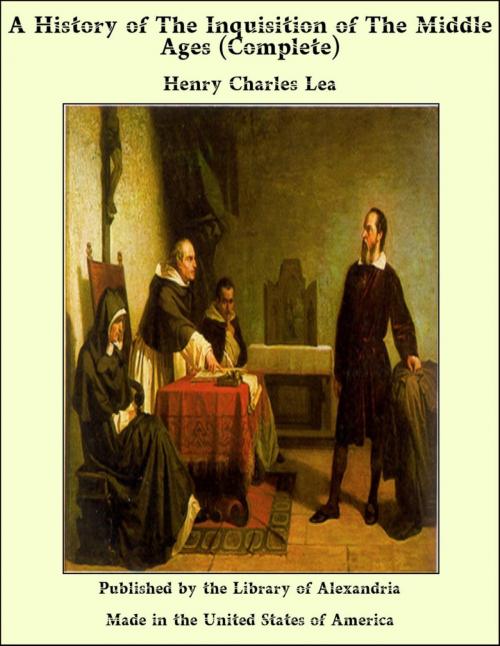A History of the Inquisition of the Middle Ages (Complete)
Nonfiction, Religion & Spirituality, New Age, History, Fiction & Literature| Author: | Henry Charles Lea | ISBN: | 9781465527240 |
| Publisher: | Library of Alexandria | Publication: | July 29, 2009 |
| Imprint: | Library of Alexandria | Language: | English |
| Author: | Henry Charles Lea |
| ISBN: | 9781465527240 |
| Publisher: | Library of Alexandria |
| Publication: | July 29, 2009 |
| Imprint: | Library of Alexandria |
| Language: | English |
THE history of the Inquisition naturally divides itself into two portions, each of which may be considered as a whole. The Reformation is the boundary-line between them, except in Spain, where the New Inquisition was founded by Ferdinand and Isabella. In the present work I have sought to present an impartial account of the institution as it existed during the earlier period. For the second portion I have made large collections of material, through which I hope in due time to continue the history to its end. The Inquisition was not an organization arbitrarily devised and imposed upon the judicial system of Christendom by the ambition or fanaticism of the Church. It was rather a natural?one may almost say an inevitable?evolution of the forces at work in the thirteenth century, and no one can rightly appreciate the process of its development and the results of its activity without a somewhat minute consideration of the factors controlling the minds and souls of men during the ages which laid the foundation of modern civilization. To accomplish this it has been necessary to pass in review nearly all the spiritual and intellectual movements of the Middle Ages, and to glance at the condition of society in certain of its phases. At the commencement of my historical studies I speedily became convinced that the surest basis of investigation for a given period lay in an examination of its jurisprudence, which presents without disguise its aspirations and the means regarded as best adapted for their realization. I have accordingly devoted much space to the origin and development of the inquisitorial process, feeling convinced that in this manner only can we understand the operations of the Holy Office and the influence which it exercised on successive generations. By the application of the results thus obtained it has seemed to me that many points which have been misunderstood or imperfectly appreciated can be elucidated. If in this I have occasionally been led to conclusions differing from those currently accepted, I beg the reader to believe that the views presented have not been hastily formed, but that they are the outcome of a conscientious survey of all the original sources accessible to me. No serious historical work is worth the writing or the reading unless it conveys a moral, but to be useful the moral must develop itself in the mind of the reader without being obtruded upon him. Especially is this the case in a history treating of a subject which has called forth the fiercest passions of man, arousing alternately his highest and his basest impulses. I have not paused to moralize, but I have missed my aim if the events narrated are not so presented as to teach their appropriate lesson
THE history of the Inquisition naturally divides itself into two portions, each of which may be considered as a whole. The Reformation is the boundary-line between them, except in Spain, where the New Inquisition was founded by Ferdinand and Isabella. In the present work I have sought to present an impartial account of the institution as it existed during the earlier period. For the second portion I have made large collections of material, through which I hope in due time to continue the history to its end. The Inquisition was not an organization arbitrarily devised and imposed upon the judicial system of Christendom by the ambition or fanaticism of the Church. It was rather a natural?one may almost say an inevitable?evolution of the forces at work in the thirteenth century, and no one can rightly appreciate the process of its development and the results of its activity without a somewhat minute consideration of the factors controlling the minds and souls of men during the ages which laid the foundation of modern civilization. To accomplish this it has been necessary to pass in review nearly all the spiritual and intellectual movements of the Middle Ages, and to glance at the condition of society in certain of its phases. At the commencement of my historical studies I speedily became convinced that the surest basis of investigation for a given period lay in an examination of its jurisprudence, which presents without disguise its aspirations and the means regarded as best adapted for their realization. I have accordingly devoted much space to the origin and development of the inquisitorial process, feeling convinced that in this manner only can we understand the operations of the Holy Office and the influence which it exercised on successive generations. By the application of the results thus obtained it has seemed to me that many points which have been misunderstood or imperfectly appreciated can be elucidated. If in this I have occasionally been led to conclusions differing from those currently accepted, I beg the reader to believe that the views presented have not been hastily formed, but that they are the outcome of a conscientious survey of all the original sources accessible to me. No serious historical work is worth the writing or the reading unless it conveys a moral, but to be useful the moral must develop itself in the mind of the reader without being obtruded upon him. Especially is this the case in a history treating of a subject which has called forth the fiercest passions of man, arousing alternately his highest and his basest impulses. I have not paused to moralize, but I have missed my aim if the events narrated are not so presented as to teach their appropriate lesson















